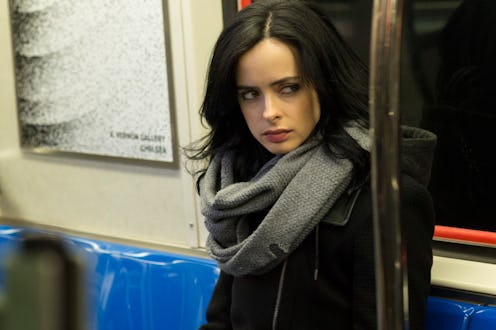Entertainment
‘Jessica Jones’ Is A Feminist Antihero We Need

If there’s one thing that I am sure of about humanity, it is this: we’re kind of a complicated bunch. Which is why I tend to cringe whenever I see any characters that are one-dimensional, single note, or predictable in any sort of way. Especially if they are female characters. Mainly because it gets my feminist feathers in a twist, but also because I don’t actually know any women who are like that. The women I know aren’t one thing or another; they are incredible mixtures of every binary in the book. Which is why, as a viewer of all things entertainment, I find myself drawn to the antihero. I like characters like Walter White, who I’m supposed to be rooting for but who does terrible things like sell drugs and kill people and get a little too rough with his unsuspecting wife. Because antiheros, by definition, are difficult to like. They are protagonists who lack typical heroic qualities like, you know, courage and morality. The two biggies. And where a classic hero has one tragic flaw, an antihero has a ton of them. But, as much as I love me some antiheroes, I’ve been pretty bummed to see most of the ones being cast today are roles written for men.
Enter Jessica Jones, the lead character in the new Netflix series by the same name. Not only is she a female protagonist—that alone is reason enough to celebrate these days—she’s also one of the first female antiheroes depicted on television. (Although the numbers are slowly growing; some argue that Rachel in UnREAL is also a female antihero.)
The show and lead character, created by Melissa Rosenberg, are based off of the relatively unknown Marvel character by the same name. Jessica Jones, for her part, is a former superhero who opens a detective agency after a tragic end to her superhero career. The show is incredibly noir in tone and touches on some seriously dark topics, like rape, assault, and PTSD.
But like any classic antihero, Jones is complicated. Half the time I can’t tell if I like her, and the other half of them time I find myself wondering if I am even supposed to consider liking her. Maybe liking her isn’t what it’s all about. Unlike typical protagonists that tend to be one-note, the antihero is rarely predictable and always painfully human. Jones, in particular, is rough around the edges. With a dry sense of humor and a sarcastic wit, sometimes she’s kind of a jerk. But this sort of hard-to-like character is just the kind of female character we need more of on television. She’s not an object for our liking or hating like so many female characters on television and in film are made to be these days. She’s fiercely herself, painfully, I’d say, and she is showing the world a kind of woman who is human and complicated and sometimes downright difficult to like.
If that isn’t the kind of woman we need more of in television, then I don’t know what is.
Image: Netflix (2)